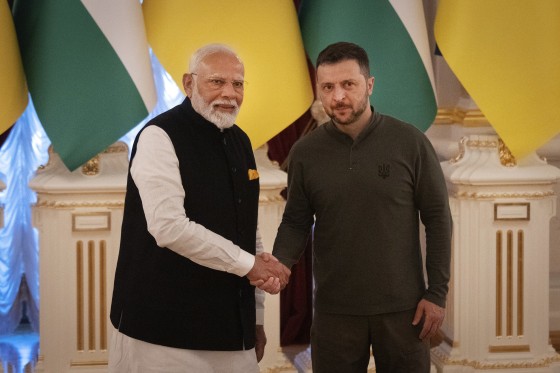
The talks were held on the sidelines of the United Nations General Assembly (UNGA), where global leaders had gathered to discuss pressing international issues. Zelenskyy used the opportunity to brief Modi on the latest developments in Ukraine, including the continuing military challenges posed by Russia. Modi reiterated India's consistent stance that diplomacy and negotiations are the preferred avenues to address the conflict. He expressed concern about the humanitarian consequences of the war and the impact on global food and energy security.
Modi's approach to the Ukraine crisis has remained largely neutral since the beginning of the conflict in February 2022. India has avoided directly condemning Russia while calling for respect for international law, sovereignty, and territorial integrity. At the same time, India has consistently pushed for peace talks, underscoring the importance of de-escalation and ceasefire agreements. Modi’s statement during the meeting underlined India's position as a potential mediator, aiming to foster dialogue between the warring parties.
This meeting followed Modi’s historic visit to Kyiv earlier this year, where he met with Zelenskyy to discuss India's role in the peace process. India has also ramped up humanitarian assistance to Ukraine, sending medical supplies, food aid, and financial support to help with recovery efforts in the war-torn nation. Additionally, Modi called for a swift and early resolution to the conflict, echoing concerns voiced by other global leaders over the prolonged nature of the war.
For Zelenskyy, India's involvement represents a crucial element in gathering global support. Ukraine continues to seek international backing to counter Russia's military offensives and recover occupied territories. Zelenskyy has sought to build alliances with non-Western nations, recognizing that countries like India hold significant sway in the global diplomatic arena. Ukraine's president has consistently called for tougher international sanctions on Russia and an increased supply of military aid, though India has refrained from taking such steps directly.
India's balancing act in the geopolitical landscape has been of significant interest. The country, while maintaining strong ties with Russia, has also expanded its relationships with the United States and European Union—both of whom are firm backers of Ukraine. This balancing strategy has allowed India to maintain its strategic autonomy and play a role as a potential mediator.
The Modi-Zelenskyy dialogue further signals that India is open to facilitating diplomatic channels in the Ukraine conflict. Although no specific mediation initiative was announced during this meeting, the emphasis on dialogue and peacebuilding aligns with India's broader foreign policy objectives. Modi’s call for diplomacy reflects his government's continued commitment to multi-alignment in foreign affairs, where India engages with various global powers without becoming entrenched in any one camp.
The discussion between the two leaders comes at a time when the conflict has entered a particularly difficult phase. Ukraine's much-anticipated counteroffensive, aimed at regaining territory from Russian forces, has made slow progress, and both sides continue to suffer heavy losses. Diplomatic efforts by Western nations have so far failed to bring the conflict to an end, with Russia showing little willingness to negotiate. In this context, India’s involvement offers a glimmer of hope for renewed peace talks, though substantial hurdles remain.
Meanwhile, the global ramifications of the war, especially in terms of energy markets and food security, continue to be felt. Ukraine, a major grain exporter, has struggled to maintain its agricultural exports due to Russian blockades and attacks on its infrastructure. This has led to a global food crisis, particularly in developing nations that rely on Ukrainian grain. Modi emphasized the need for stability in food and energy markets during the meeting, acknowledging the far-reaching impacts of the war.
